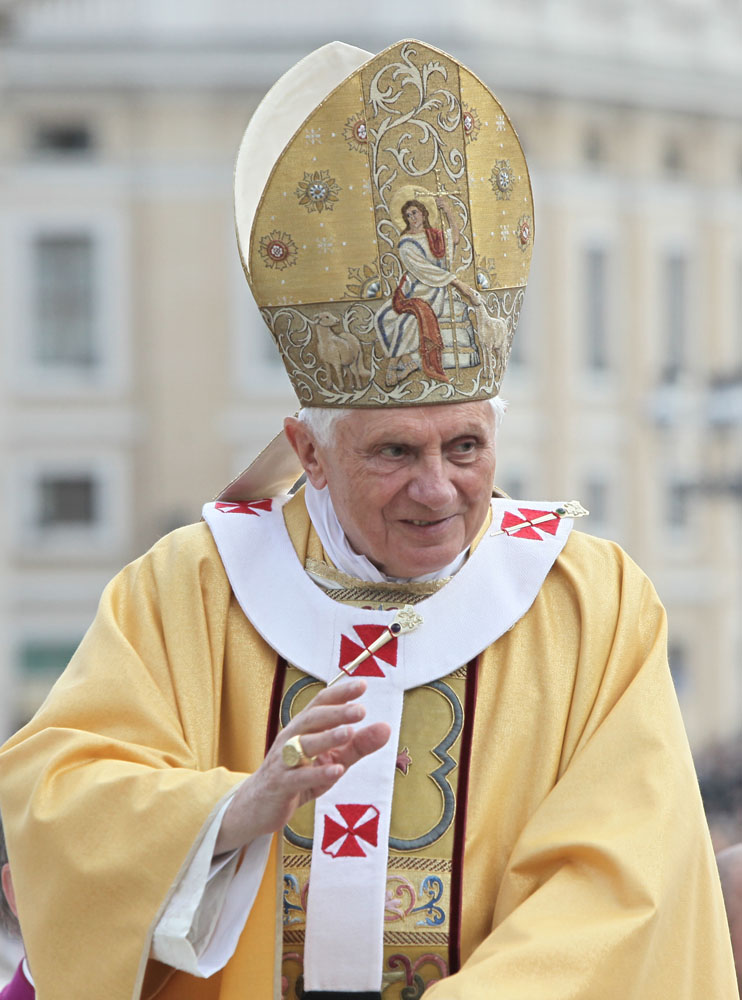
Pope Benedict XVI
Pope Benedict XVI (Latin: Benedictus PP. XVI; Italian: Benedetto XVI; German: Benedikt XVI; born Joseph Aloisius Ratzinger; 16 April 1927 – 31 December 2022) was the head of the Catholic Church and sovereign of the Vatican City State from 19 April 2005 until his resignation on 28 February 2013. Benedict's election as pope occurred in the 2005 papal conclave that followed the death of Pope John Paul II. Benedict chose to be known as "Pope emeritus" upon his resignation, and he retained this title until his death in 2022.[9][10]
Benedict XVI
19 April 2005
28 February 2013
29 June 1951
by Michael von Faulhaber
28 May 1977
by Josef Stangl
27 June 1977
by Paul VI
31 December 2022 (aged 95)
Mater Ecclesiae Monastery, Vatican City
German (with Vatican citizenship)
- Dean of the College of Cardinals (2002–2005)
- Cardinal Bishop of Ostia (2002–2005)
- Cardinal Bishop of Velletri–Segni (1993–2005)
- Prefect of the Congregation for the Doctrine of the Faith (1982–2005)
- President of the International Theological Commission (1982–2005)
- President of the Pontifical Biblical Commission (1982–2005)
- Cardinal Priest of Santa Maria Consolatrice al Tiburtino (1977–1993)
- Archbishop of Munich and Freising (1977–1982)
Cooperatores veritatis
(Latin for 'Cooperators of the truth')
- Rejection of dehellenization
- Hermeneutic of continuity
29 October 1950
Freising Cathedral, Freising
29 June 1951
Freising Cathedral, Freising
28 May 1977
27 June 1977
12 May 1984
12 May 1984
25 May 2002
6 January 2004
8 September 2004
29 September 2007
29 September 2007
29 September 2007
29 September 2007
29 September 2007
29 September 2007
12 September 2009
12 September 2009
12 September 2009
12 September 2009
12 September 2009
5 February 2011
5 February 2011
5 February 2011
5 February 2011
5 February 2011
6 January 2012
6 January 2012
6 January 2013
6 January 2013
6 January 2013
6 January 2013
Your Holiness
Holy Father
Ordained as a priest in 1951 in his native Bavaria, Ratzinger embarked on an academic career and established himself as a highly regarded theologian by the late 1950s. He was appointed a full professor in 1958 at the age of 31. After a long career as a professor of theology at several German universities, he was appointed Archbishop of Munich and Freising and created a cardinal by Pope Paul VI in 1977, an unusual promotion for someone with little pastoral experience. In 1981, he was appointed Prefect of the Congregation for the Doctrine of the Faith, one of the most important dicasteries of the Roman Curia. From 2002 until he was elected pope, he was also Dean of the College of Cardinals. Before becoming pope, he had been "a major figure on the Vatican stage for a quarter of a century"; he had had an influence "second to none when it came to setting church priorities and directions" as one of John Paul II's closest confidants.[11]
Benedict's writings were prolific and generally defended traditional Catholic doctrine, values, and liturgy.[12] He was originally a liberal theologian but adopted conservative views after 1968.[13] During his papacy, Benedict advocated a return to fundamental Christian values to counter the increased secularisation of many Western countries. He viewed relativism's denial of objective truth, and the denial of moral truths in particular, as the central problem of the 21st century. Benedict also revived several traditions and permitted greater use of the Tridentine Mass.[14] He strengthened the relationship between the Catholic Church and art, promoted the use of Latin,[15] and reintroduced traditional papal vestments, for which reason he was called "the pope of aesthetics".[16] Benedict's handling of sexual abuse cases within the Catholic Church and opposition to usage of condoms in areas of high HIV transmission led to substantial criticism from public health officials, anti-AIDS activists, and victim's rights organizations.[17][18]
On 11 February 2013, Benedict announced his (effective 28 February 2013) resignation, citing a "lack of strength of mind and body" due to his advanced age. His resignation was the first by a pope since Gregory XII in 1415, and the first on a pope's initiative since Celestine V in 1294. He was succeeded by Francis on 13 March 2013 and moved into the newly renovated Mater Ecclesiae Monastery in Vatican City for his retirement. In addition to his native German language, Benedict had some level of proficiency in French, Italian, English, and Spanish. He also knew Portuguese, Latin, Biblical Hebrew, and Biblical Greek.[19][20][21] He was a member of several social science academies, such as the French Académie des Sciences Morales et Politiques. He played the piano and had a preference for Mozart and Bach.[22]
Positions on morality and politics
Contraception and HIV/AIDS
In 2005, the Pope listed several ways to combat the spread of HIV, including chastity, fidelity in marriage, and anti-poverty efforts; he also rejected the use of condoms.[306] The alleged Vatican investigation of whether there are any cases when married persons may use condoms to protect against the spread of infections surprised many Catholics in the wake of John Paul II's consistent refusal to consider condom use in response to AIDS.[307] However, the Vatican has since stated that no such change in the Church's teaching can occur.[308] TIME also reported in its edition of 30 April 2006 that the Vatican's position remains what it always has been with Vatican officials "flatly dismiss[ing] reports that the Vatican is about to release a document that will condone any condom use."[308]
In March 2009, the Pope stated:
A variety of awards and honours were given to Benedict including the following:
